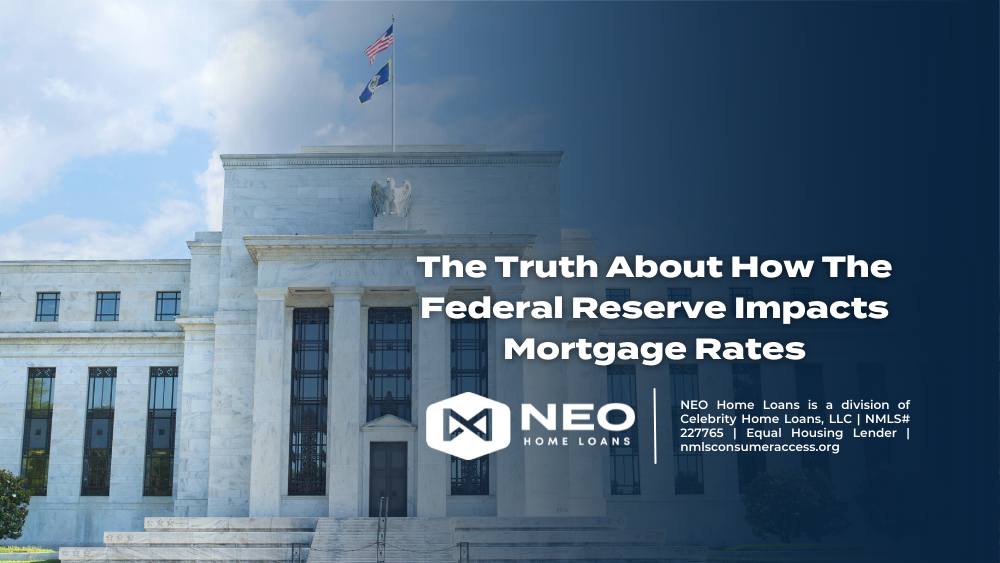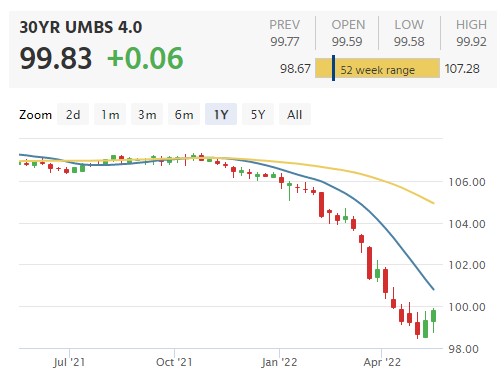
On Tuesday, Federal Reserve Chair Jerome Powell underscored the Federal Reserve’s determination to keep raising interest rates until there is clear evidence inflation is falling.
This announcement comes just a few weeks after the Fed raised the Fed Funds rate by half a percentage point, marking its most agressive step yet to fight the highest inflation rate the United States has seen in 40 years.
This will likely lead to lots of news articles about the “Fed raising mortgage rates.” Every time a rate announcement from the Federal Reserve comes along, we start to see an uptick in articles about what will happen with mortgage rates, with the most common ones being “rates expected to rise” or “rates could move even lower thanks to Fed rate cut.”
While it makes for a good headline, much of what is thrown out in the media about the relationship between mortgage rates and the Federal Reserve is not true.
This article will explain exactly what it means when the Federal Reserve raises interest rates, why they do it, and why their decisions have an impact on (but do not directly affect) mortgage rates.
What is the Federal Reserve Responsible For?
When people talk about America’s monetary policy, they’re referring to the actions taken by the Federal Reserve Bank (the Fed) that affect the availability and cost of money and credit. The Federal Reserve’s job is to keep the economy running smoothly.
The Fed has what is called the “Dual Mandate“: to keep prices stable and promote full employment. Basically, that means keeping inflation at an optimal level and promoting economic growth. Too little inflation can mean stagnant economic growth, while too rapid growth can produce high inflation.
The main way the Fed does this is by influencing interest rates. Lower interest rates help boost the economy and encourage higher inflation, while higher rates can cool down an overheated economy and rein in inflation.
The key tool here is the federal funds rate (or fed funds rate). This is the rate that banks charge each other when they make overnight loans to other banks using money deposited at the Federal Reserve. At each meeting, the Federal Open Market Committee (a subdivision of the Fed that regulates open market operations) raises, lowers, or keeps the fed funds rate the same.
How Does Raising The Fed Funds Rate Combat Inflation?
The fed funds rate is basically the lowest rate charged for any type of lending. As a result, it sets the pattern for interest rates of all sorts.
A lower federal funds rate allows banks to borrow money at lower interest rates. The banks can then pass on these savings to consumers in the form of lower interest rates on things like auto loans and other lines of credit. These lower rates help increase consumer spending bringing more money into the economy.
A higher rate makes borrowing more expensive, which can pump the brakes on the economy and help get inflation under control.
With rate hikes, the Fed policymakers’ goal is to make borrowing more expensive so that consumers and businesses hold off on making any investments. Their hope is that demand for goods will cool off and eventually suppress prices.
How Does the Fed Funds Rate Impact Mortgage Rates?
When the Fed gets together to set the target rate for the fed funds rate, financial markets (stocks, bonds, etc.) pay attention and react. So does the media, because it’s generally a big deal and does have an impact on the pockets of all Americans.
This leads to headlines warning about increased borrowing costs across the board. With the housing market how it is today, stories about the impact of the Fed’s decision on mortgage rates are become increasingly prolific.
As we mentioned earlier, the Fed does not directly price mortgages. The members of the Board of Governors of the Federal Reserve don’t sit down and say, “Hey, the 30-year fixed mortgage rate should be 5%, not 4%. Let’s increase rates!” They simply discuss the state of the broader economy, inflation, and monetary policy and adjust rates accordingly.
However, when the Fed adjusts these short-term interest rates, we do see some correlation with long-term interest rates like mortgages.
Mortgage rates are determined by the supply and demand for mortgage bonds in the bond market. A mortgage bond is an investment that is made up of a bundle of home loans bought from the banks that issued them. Mortgage bonds are also referred to as Mortgage Backed Securities.
When mortgage bond prices go up, mortgage rates go down.
When mortgage bond prices go down, mortgage rates go up.
The fed funds rate does not have a direct correlation with mortgages rates, but as you can see in the screenshot below from Mortgage News Daily, mortgage bonds have been trading down ever since the initial announcement from the Federal Reserve, meaning the prices are down and the rates are up.

Why is this happening? Since the start of the pandemic, the Federal Reserve was the biggest buyer of mortgage bonds, which is why mortgage rates have been so low for the last two years.
In response to inflation, the Fed is now switching course and winding down its purchases, which in turn is leading to the selling of the mortgage bonds.
This sudden change in the bond market directly affects mortgage rates. Less demand for mortgage bonds means issuer needs to offer higher yields to attract investors. So, lenders have to raise interest rates on the mortgages inside those bonds. And that’s where we are today.
Conclusion
The actions of the Federal Reserve play an important, although indirect, role in determining mortgage rates. The lending industry does weigh Fed decisions, the fed fund rates and other Fed activity when setting interest rates, but mortgage rates are ultimately determined by the mortgage bond market which follows the 10-year Treasury Yield.
That being said, there’s a lot more that goes into mortgage financing, including economic trends and your financial status as a borrower. Interest rates are just one cost you have to consider when figuring out your monthly mortgage payments.
If you want to get a clear picture how much your monthly payment will be after taking out a home loan or refinancing your current mortgage, you should schedule some time to speak with a mortgage advisor. They will be able to look at your finances and tell you exactly what your mortgage payment will be with today’s current interest rates so you can be confident in shopping for a home that fits your budget.


